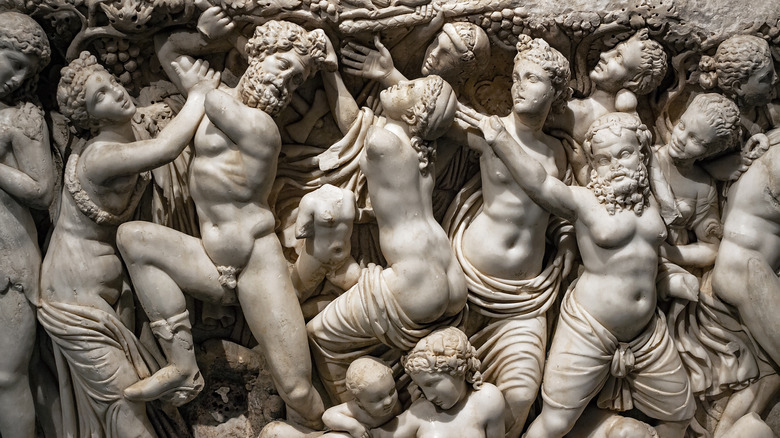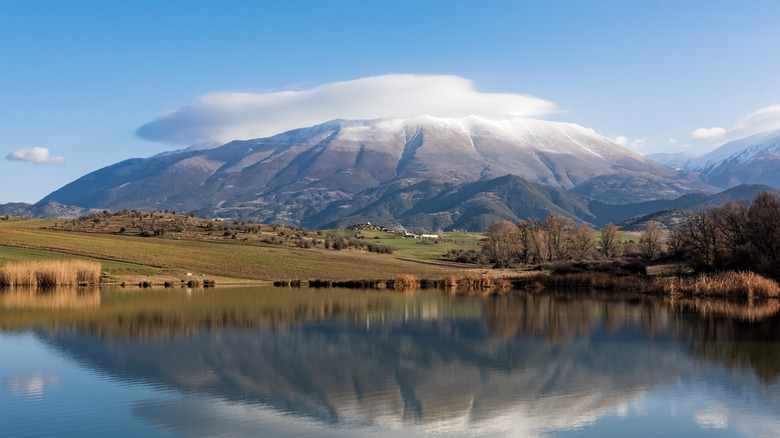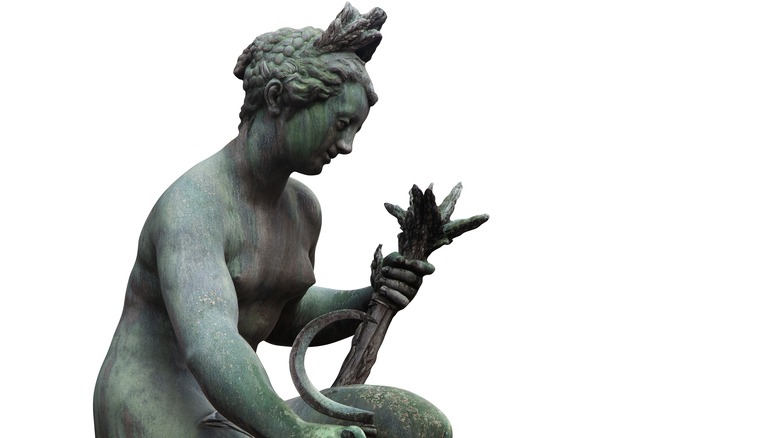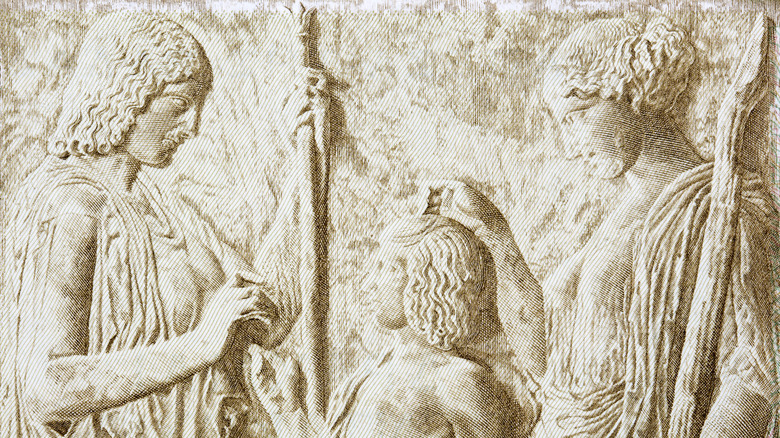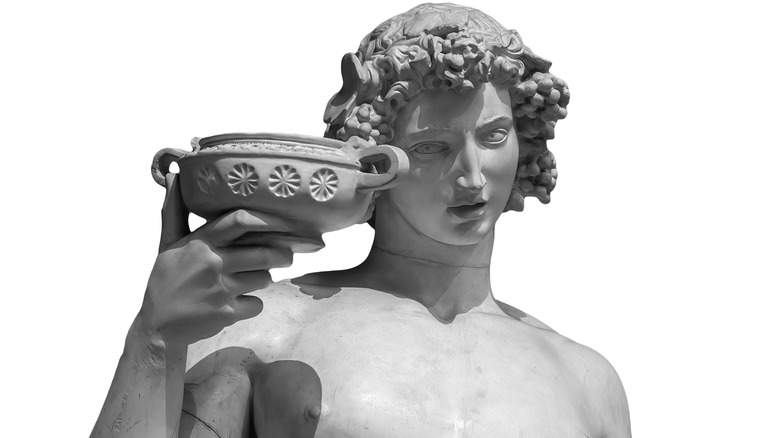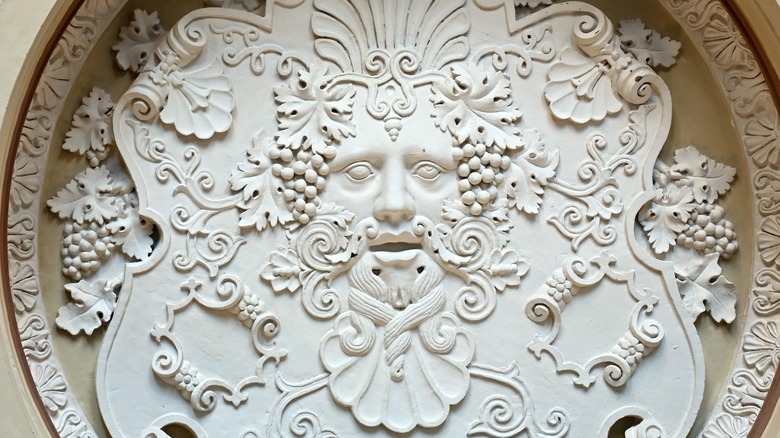The Mystery Of Two Greek Gods That Don't Fit With All The Rest
When folks think of Greek gods, they tend to envision the gods as, "Such and such, god of this," "So and so, god of that," etc. Maybe it's Aphrodite, goddess of erotic love, or Poseidon, god of salt- and freshwater. In a very monotheistic time, this might make it easier to wrap our heads around distant cultures. But having a look at Poseidon, he's also the "bringer of earthquakes and destruction," as World History Encyclopedia says. He's a protector of sailors, which makes sense, but also the patron of animal breeding, especially horses. He even has a bunch of white horses in his golden, glittering, underwater palace. So what gives here? What in the world is the connection between the ocean and horses?
Believe it or not, Poseidon is one of the gods that makes a lot more sense than others, at least to the modern mind. The Greek pantheon, which the Romans copy-pasted then adjusted to suit their society, comprises an unbelievably dense tangle of tales. That's because Greek stories evolved and permutated over hundreds, in some cases thousands, of years. The myths snowballed and accumulated fragments of disparate tales. But even so, some gods stand out in ways that make it clear that they're not indigenously Greek, or at least have unusual origins. Such is the case with Demeter and Dionysus.
The gods of Olympus
Readers might remember that the ancient Greeks believed their gods lived on Mount Olympus (pictured above). And when we say "their gods," we mean the main twelve: Zeus and his wife Hera, their son Ares, Zeus' sister Demeter, Zeus' brothers Poseidon and Hades, and a bunch of Zeus' children from various women and magical means — Apollo, Artemis, Athena, Aphrodite, Dionysus, and Hermes (outlined on Theoi). Like we said, it's a tangle. The genealogy reveals loads of symbolism, like Ares — the reviled, priggish god of warfare resulting from the union of an unhappy marriage between feuding spouses. Besides these main gods, there were literal thousands more, down to each and every naiad and nymph of each and every spring, stream, meadow, and fountain.
Even in this extremely brief overview, we see polytheism at work. Nothing was off the table, and everything could be adjusted over time. Aspects and attributes of old gods got constantly updated depending on where people traveled, what other cultures they came into contact with, and what oral stories became predominant, as sites like World History Encyclopedia recount. Few things were canon, and even the twelve core Olympians got swapped out over time. Hestia, for instance, the Roman god of the hearth, got elevated to Olympian status at some point, and so did Hercules. And Demeter? She comes across as an incredibly ancient, pre-Olympian deity. Dionysus comes across as the exact opposite: a very new, very odd godly addition.
The goddess of the harvest
Some might balk at the idea that Demeter is an unusually placed god in the Greek pantheon. After all, she's considered one of the original children of the titan Cronus, along with Zeus, Hera, Hades, Poseidon, and others (yes, Zeus and Hera, the king and queen of the gods, were siblings). Zeus, the leader of the what we might call "Deities: The Next Generation," overthrew his father's family, the titans, and installed himself and his siblings in positions of royal power, as Theoi overviews. Demeter, as his older sister, helped him. That right there is our first clue.
Demeter is so much older than Zeus that she represents the essence of nature itself and the turning of the year. Demeter's health, activity, and attentiveness create the very seasons of Earth. As Greeking states, she could be described simply as the goddess of "grain, agriculture, and fertility." What three aspects of everyday life could be more essential to human existence? Ancient Greece, like every single other civilization of antiquity, was an agricultural one. Economic prosperity, cultural growth, and even bare-bones survival all depended on the vitality of farmers, as World History Encyclopedia describes. Those farmers relied not only on the fertility of the soil, but their own bodies. They were one bad harvest and one botched pregnancy away from annihilation. This is why Demeter likely predates the Olympians as an Earth goddess from the Bronze Age or earlier, circa 3000 B.C.E., per the Metropolitan Museum of Art.
Mother and daughter reunited
World History Encyclopedia and Greeking go into further detail about Demeter and her origins. Demeter was likened to a great Mother Goddess, a chthonic deity that arose directly from Earth itself. This is utterly different from other Greek gods, all birthed from ancestor deities. This means that Demeter was probably grafted into the Greek pantheon and given a meaningful position amongst the Olympians, but she kept her original role as the embodiment of nature and the harvest. This is especially true considering how critical she was to most of Greek's population of ancient farmers — she wouldn't have vanished from the memories of the common people of the heath.
Demeter's main tale dives deeper into her link to older culture. Her daughter Persephone was kidnapped by the god of the underworld, Hades, and dragged down to his domain. Demeter roamed the earth looking for her daughter, but he couldn't find her. Because she'd abandoned her godly duties, all crops died, and famine consumed the world. In the end, Persephone was allowed to return to the world above, but because of Hades' trick, she had to return to the underworld for one-third of the year. This cycle was likened to the turning of the seasons, from spring to winter to spring, and the rollover from life to death to life. Followers of Demeter enacted her story every year in ritual format, a highly secretive tradition that came to be known as the Eleusinian Mysteries.
The twice-born god of ecstasy
And so we come to a god whose characteristics are so bizarre, with an origin so strange, that he's become a notorious oddity amongst scholarly circles: Dionysus. Most folks might think of him as the "god of wine," but this is a gross, gross understatement of his pertinence and power. As National Geographic says, Dionysus is more accurately thought of as the god of "ecstasy" and "abandon." He's like the counterpoint to Apollo, god of all things civilized, like music, medicine, and animal husbandry. Dionysus is the force inside that wants to let go and revert to wildness. This makes it easy to see why he was not only associated with wine and drinking but also with theater and theatrical displays of emotion. In fact, religious festivals to Dionysus may have formed the backbone of all secular Greek theater that we've come to know from the 5th-century B.C.E. classical Greece, from playwrights like Sophocles, Aeschylus, and Euripides.
Dionysus' origins demonstrate his unusual place in the Greek pantheon, which came late in history. Dionysus is described as one of Zeus' illegitimate sons. In the story, Hera senses that Zeus is up to something, confronts the pregnant woman involved, incinerates her, and then Zeus rescues the unborn baby. Zeus sews the baby into his thigh, and when Dionysus is ready to be born, he erupts out. Dionysus, then, is twice-born like Osiris and other gods of antiquity. He's also born not from a woman, but a man.
Removing the mask of civilization
In some stories, Dionysus is ruthless and vengeful and has nigh-limitless power to drive people to madness, like the disrespectful King Lycurgus. In other cases, as National Geographic explains, he's "genial" and playful. He's as capricious as the effects of alcohol themselves. He embodies a "force of cyclical, unbridled nature who drew men and women out of themselves through intoxication," bringing "liberation and ecstasy," and "also introduced the risks of losing hold of identity and control." In an element of further duality, Dionysus was worshipped in highly ritualized public theater and also in hidden, esoteric rites. These rites were similar in secrecy to the Eleusinian Mysteries of Demeter and also connect Dionysus to religious orders related to the god Mithras from Babylon, and Isis from Egypt.
This is why many people believe that Dionysus was an import from a culture outside of Greece. While Demeter was likely one of Greece's original, native deities, Dionysus was one of its youngest and most foreign. The legendary Greek historian Herodotus openly talked about Dionysus' incongruence in the Greek pantheon and speculated as early as the 5th century B.C.E. that Dionysus was an adapted version of the Egyptian god Osiris. He also died and was resurrected — in his case by his wife, Isis. And yes, many researchers since then have equated deities like Osiris, Dionysus, and more, with the origins of Christianity's Jesus as a derivation of underground cult traditions influencing emerging religious philosophies.
